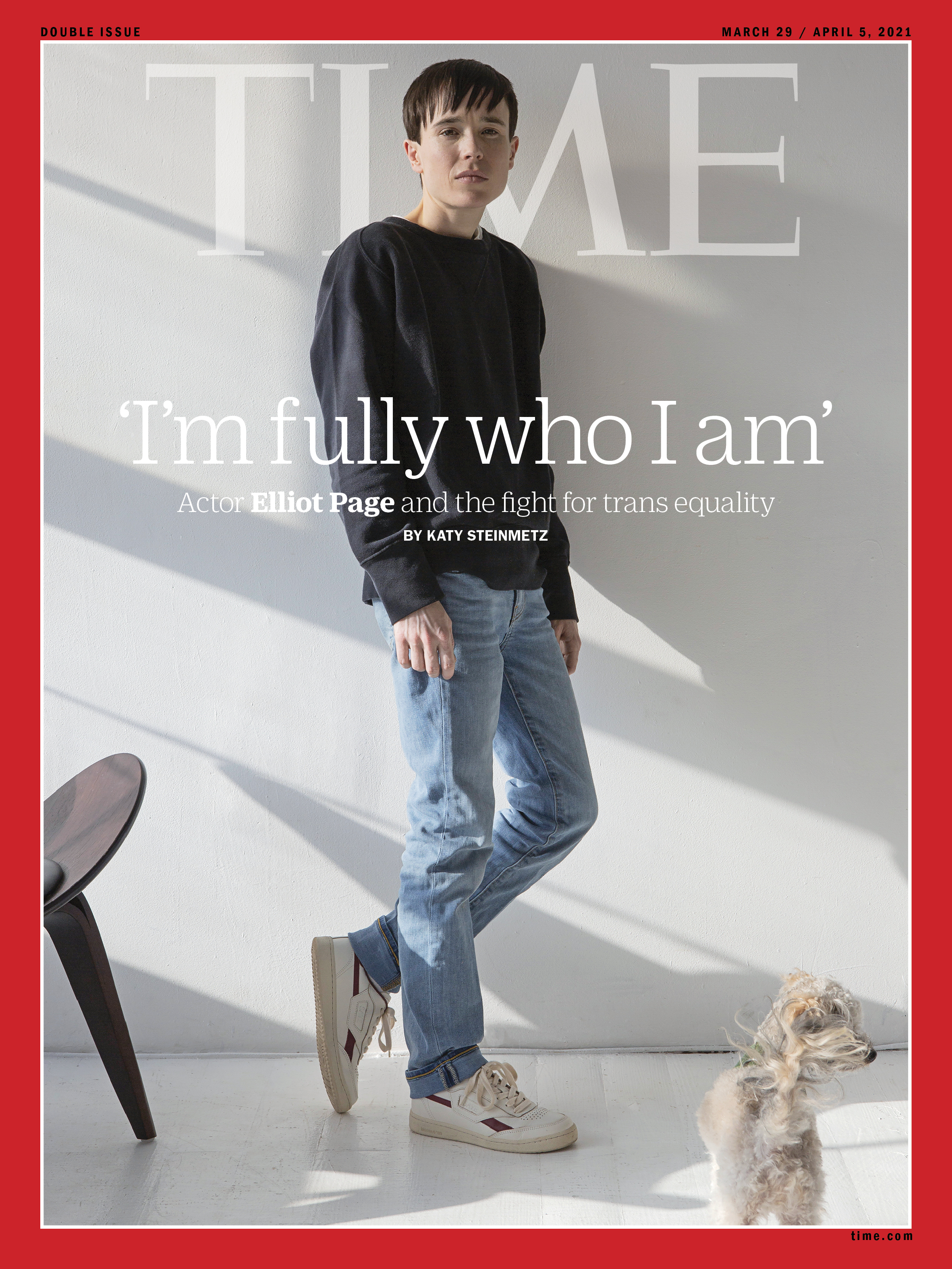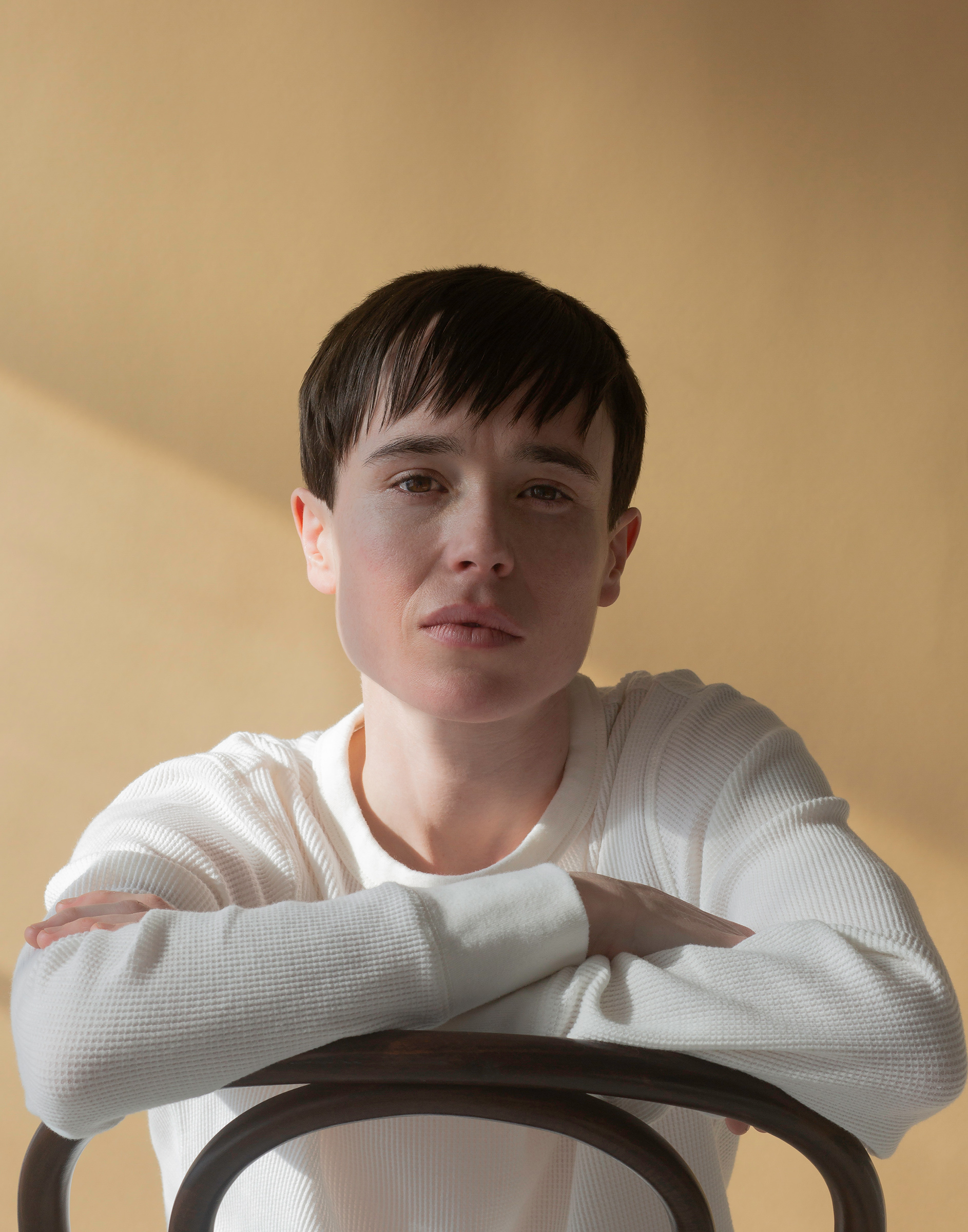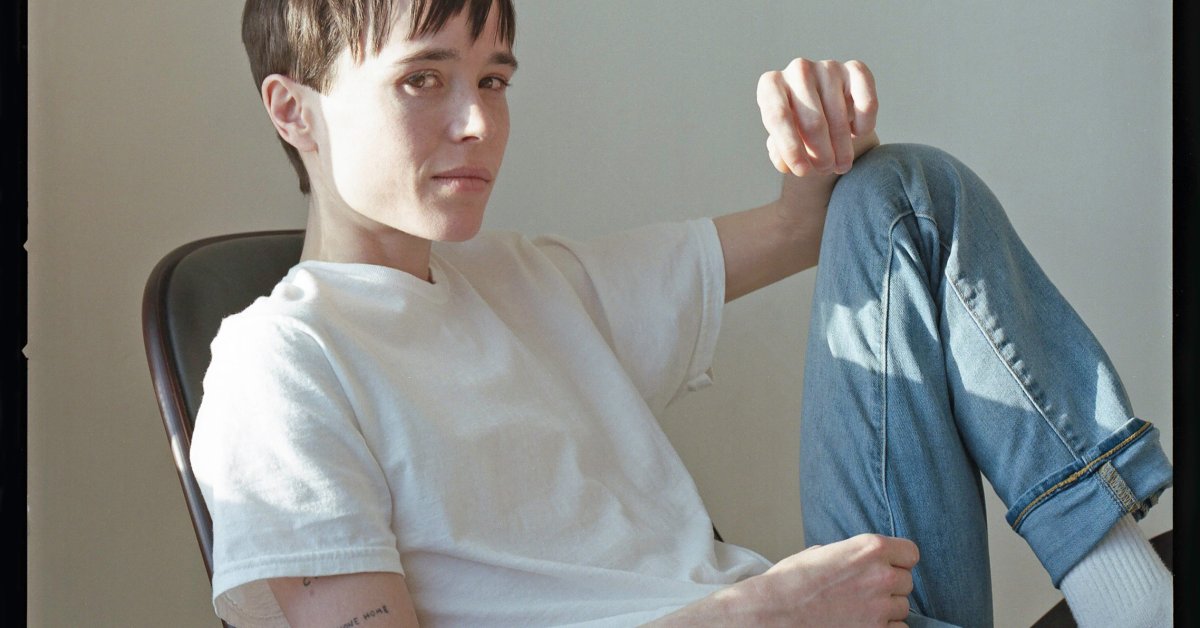[ad_1]
Elliot Page doesn’t remember exactly how long he had been asking.
But he does remember the acute feeling of triumph when, around age 9, he was finally allowed to cut his hair short. “I felt like a boy,†Page says. “I wanted to be a boy. I would ask my mom if I could be someday.†Growing up in Halifax, Nova Scotia, Page visualized himself as a boy in imaginary games, freed from the discomfort of how other people saw him: as a girl. After the haircut, strangers finally started perceiving him the way he saw himself, and it felt both right and exciting.
The joy was short-lived. Months later, Page got his first break, landing a part as a daughter in a Canadian mining family in the TV movie Pit Pony. He wore a wig for the film, and when Pit Pony became a TV show, he grew his hair out again. “I became a professional actor at the age of 10,†Page says. And pursuing that passion came with a difficult compromise. “Of course I had to look a certain way.â€
We are speaking in late February. It is the first interview Page, 34, has given since disclosing in December that he is transgender, in a heartfelt letter posted to Instagram, and he is crying before I have even uttered a question. “Sorry, I’m going to be emotional, but that’s cool, right?†he says, smiling through his tears.
It’s hard for him to talk about the days that led up to that disclosure. When I ask how he was feeling, he looks away, his neck exposed by a new short haircut. After a pause, he presses his hand to his heart and closes his eyes. “This feeling of true excitement and deep gratitude to have made it to this point in my life,†he says, “mixed with a lot of fear and anxiety.â€
It’s not hard to understand why a trans person would be dealing with conflicting feelings in this moment. Increased social acceptance has led to more young people describing themselves as trans—1.8% of Gen Z compared with 0.2% of boomers, according to a recent Gallup poll—yet this has fueled conservatives who are stoking fears about a “transgender craze.†President Joe Biden has restored the right of transgender military members to serve openly, and in Hollywood, trans people have never had more meaningful time onscreen. Meanwhile, J.K. Rowling is leveraging her cultural capital to oppose transgender equality in the name of feminism, and lawmakers are arguing in the halls of Congress over the validity of gender identities. “Sex has become a political football in the culture wars,†says Chase Strangio, deputy director for transgender justice at the ACLU.

Photograph by Wynne Neilly for TIME
And so Page—who charmed America as a precocious pregnant teenager in Juno, constructed dreamscapes in Inception and now stars in Netflix’s hit superhero show The Umbrella Academy, the third season of which he’s filming in Toronto—expected that his news would be met with both applause and vitriol. “What I was anticipating was a lot of support and love and a massive amount of hatred and transphobia,†says Page. “That’s essentially what happened.†What he did not anticipate was just how big this story would be. Page’s announcement, which made him one of the most famous out trans people in the world, started trending on Twitter in more than 20 countries. He gained more than 400,000 new followers on Instagram on that day alone. Thousands of articles were published. Likes and shares reached the millions. Right-wing podcasters readied their rhetoric about “women in men’s locker rooms.†Casting directors reached out to Page’s manager saying it would be an honor to cast Page in their next big movie.
So, it was a lot. Over the course of two conversations, Page will say that understanding himself in all the specifics remains a work in progress. Fathoming one’s gender, an identity innate and performed, personal and social, fixed and evolving, is complicated enough without being under a spotlight that never seems to turn off. But having arrived at a critical juncture, Page feels a deep sense of responsibility to share his truth. “Extremely influential people are spreading these myths and damaging rhetoric—every day you’re seeing our existence debated,†Page says. “Transgender people are so very real.â€
***
That role in Pit Pony led to other productions and eventually, when Page was 16, to a film called Mouth to Mouth. Playing a young anarchist, Page had a chance to cut his hair again. This time, he shaved it off completely. The kids at his high school teased him, but in photos he has posted from that time on social media he looks at ease. Page’s head was still shaved when he mailed in an audition tape for the 2005 thriller Hard Candy. The people in charge of casting asked him to audition again in a wig. Soon, the hair was back.
Page’s tour de force performance in Hard Candy led, two years later, to Juno, a low-budget indie film that brought Page Oscar, BAFTA and Golden Globe nominations and sudden megafame. The actor, then 21, struggled with the stresses of that ascension. The endless primping, red carpets and magazine spreads were all agonizing reminders of the disconnect between how the world saw Page and who he knew himself to be. “I just never recognized myself,†Page says. “For a long time I could not even look at a photo of myself.†It was difficult to watch the movies too, especially ones in which he played more feminine roles.
Page loved making movies, but he also felt alienated by Hollywood and its standards. Alia Shawkat, a close friend and co-star in 2009’s Whip It, describes all the attention from Juno as scarring. “He had a really hard time with the press and expectations,†Shawkat says. “‘Put this on! And look this way! And this is sexy!’â€
By the time he appeared in blockbusters like X-Men: The Last Stand and Inception, Page was suffering from depression, anxiety and panic attacks. He didn’t know, he says, “how to explain to people that even though [I was] an actor, just putting on a T-shirt cut for a woman would make me so unwell.†Shawkat recalls Page’s struggles with clothes. “I’d be like, ‘Hey, look at all these nice outfits you’re getting,’ and he would say, ‘It’s not me. It feels like a costume,’†she says. Page tried to convince himself that he was fine, that someone who was fortunate enough to have made it shouldn’t have complaints. But he felt exhausted by the work required to “just exist,†and thought more than once about quitting acting.
In 2014, Page came out as gay, despite feeling for years that “being out was impossible†given his career. (Gender identity and sexual orientation are, of course, distinct, but one queer identity can coexist with another.) In an emotional speech at a Human Rights Campaign conference, Page talked about being part of an industry “that places crushing standards†on actors and viewers alike. “There are pervasive stereotypes about masculinity and femininity that define how we’re all supposed to act, dress and speak,†Page went on. “And they serve no one.â€
The actor started wearing suits on the red carpet. He found love, marrying choreographer Emma Portner in 2018. He asserted more agency in his career, producing his own films with LGBTQ leads like Freeheld and My Days of Mercy. And he made a masculine wardrobe a condition of taking roles. Yet the daily discord was becoming unbearable. “The difference in how I felt before coming out as gay to after was massive,†says Page. “But did the discomfort in my body ever go away? No, no, no, no.â€
***
In part, it was the isolation forced by the pandemic that brought to a head Page’s wrestling with gender. (Page and Portner separated last summer, and the two divorced in early 2021. “We’ve remained close friends,†Page says.) “I had a lot of time on my own to really focus on things that I think, in so many ways, unconsciously, I was avoiding,†he says. He was inspired by trailblazing trans icons like Janet Mock and Laverne Cox, who found success in Hollywood while living authentically. Trans writers helped him understand his feelings; Page saw himself reflected in P. Carl’s memoir Becoming a Man. Eventually “shame and discomfort†gave way to revelation. “I was finally able to embrace being transgender,†Page says, “and letting myself fully become who I am.â€
This led to a series of decisions. One was asking the world to call him by a different name, Elliot, which he says he’s always liked. Page has a tattoo that says E.P. PHONE HOME, a reference to a movie about a young boy with that name. “I loved E.T. when I was a kid and always wanted to look like the boys in the movies, right?†he says. The other decision was to use different pronouns—for the record, both he/him and they/them are fine. (When I ask if he has a preference on pronouns for the purposes of this story, Page says, “He/him is great.â€)
A day before we first speak, Page will talk to his mom about this interview and she will tell him, “I’m just so proud of my son.†He grows emotional relating this and tries to explain that his mom, the daughter of a minister, who was born in the 1950s, was always trying to do what she thought was best for her child, even if that meant encouraging young Page to act like a girl. “She wants me to be who I am and supports me fully,†Page says. “It is a testament to how people really change.â€

These photos, given to TIME by Page—from left, at age 5, 6 and 7—show him as he wanted to be seen
Courtesy Elliot Page
Another decision was to get top surgery. Page volunteers this information early in our conversation; at the time he posted his disclosure on Instagram, he was recovering in Toronto. Like many trans people, Page emphasizes being trans isn’t all about surgery. For some people, it’s unnecessary. For others, it’s unaffordable. For the wider world, the media’s focus on it has sensationalized transgender bodies, inviting invasive and inappropriate questions. But Page describes surgery as something that, for him, has made it possible to finally recognize himself when he looks in the mirror, providing catharsis he’s been waiting for since the “total hell†of puberty. “It has completely transformed my life,†he says. So much of his energy was spent on being uncomfortable in his body, he says. Now he has that energy back.
***
For the transgender community at large, visibility does not automatically lead to acceptance. Around the globe, transgender people deal disproportionately with violence and discrimination. Anti-trans hate crimes are on the rise in the U.K. along with increasingly transphobic rhetoric in newspapers and tabloids. In the U.S., in addition to the perennial challenges trans people face with issues like poverty and homelessness, a flurry of bills in state legislatures would make it a crime to provide transition-related medical care to trans youth. And crass old jokes are still in circulation. When Biden lifted the ban on open service for transgender troops, Saturday Night Live’s Michael Che did a bit on Weekend Update about the policy being called “don’t ask, don’t tuck.â€
Page says coming out as trans was “selfish†on one level: “It’s for me. I want to live and be who I am.†But he also felt a moral imperative to do so, given the times. Human identity is complicated and mysterious, but politics insists on fitting everything into boxes. In today’s culture wars, simplistic beliefs about gender—e.g., chromosomes = destiny—are so widespread and so deep-seated that many people who hold those beliefs don’t feel compelled to consider whether they might be incomplete or prejudiced. On Feb. 24, after a passionate debate on legislation that would ban discrimination against LGBTQ people, Representative Marie Newman, an Illinois Democrat, proudly displayed the pride flag in support of her daughter, who is trans. Representative Marjorie Taylor Greene, a Georgia Republican, responded by hanging a poster outside her office that read: There are TWO genders: MALE & FEMALE.
The next day Dr. Rachel Levine, who stands to become the first openly transgender federal official confirmed by the Senate, endured a tirade from Senator Rand Paul about “genital mutilation†during her confirmation hearing. My second conversation with Page happens shortly after this. He brings it up almost immediately, and seems both heartbroken and determined. He wants to emphasize that top surgery, for him, was “not only life-changing but lifesaving.†He implores people to educate themselves about trans lives, to learn how crucial medical care can be, to understand that lack of access to it is one of the many reasons that an estimated 41% of transgender people have attempted suicide, according to one survey.
Page has been in the political trenches for a while, having leaned into progressive activism after coming out as queer in 2014. For two seasons, he and best friend Ian Daniel filmed Gaycation, a Viceland series that explored LGBTQ culture around the world and, at one point, showed Page grilling Senator Ted Cruz at the Iowa State Fair about discrimination against queer people. In 2019, Page made a documentary called There’s Something in the Water, which explores environmental hardships experienced by communities of color in Nova Scotia, with $350,000 of his own money. That activism extends to his own industry: in 2017, he published a Facebook post that, among other things, accused director Brett Ratner of forcibly outing him as gay on the set of an X-Men movie. (A representative for Ratner did not respond to a request for comment.)
As a trans person who is white, wealthy and famous, Page has a unique kind of privilege, and with it an opportunity to advocate for those with less. According to the U.S. Trans Survey, a large-scale report from 2015, transgender people of color are more likely to experience unemployment, harassment by police and refusals of medical care. Nearly half of all Black respondents reported being denied equal treatment, verbally harassed and/or physically attacked in the past year. Trans people as a group fare much worse on such stats than the general population. “My privilege has allowed me to have resources to get through and to be where I am today,†Page says, “and of course I want to use that privilege and platform to help in the ways I can.â€

Since his disclosure, Page has been mostly quiet on social media. One exception has been to tweet on behalf of the ACLU, which is in the midst of fighting anti-trans bills and laws around the country, including those that ban transgender girls and women from participating in sports. Mississippi Governor Tate Reeves says he will sign such a bill in the name of “protect[ing] young girls.†Page played competitive soccer and vividly recalls the agony of being told he would have to play on the girls’ team once he aged out of mixed-gender squads. After an appeal, Page was allowed to play with the boys for an additional year. Today, several bills list genitalia as a requirement for deciding who plays on which team. “I would have been in that position as a kid,†Page says. “It’s horrific.â€
All this advocacy is unlikely to make life easier. “You can’t enter into certain spaces as a public trans person,†says the ACLU’s Strangio, “without being prepared to spend some percentage of your life being threatened and harassed.†Yet, while he seems overwhelmed at times, Page is also eager. Many of the political attacks on trans people—whether it is a mandate that bathroom use be determined by birth sex, a blanket ban on medical interventions for trans kids or the suggestion that trans men are simply wayward women beguiled by male privilege—carry the same subtext: that trans people are mistaken about who they are. “We know who we are,†Page says. “People cling to these firm ideas [about gender] because it makes people feel safe. But if we could just celebrate all the wonderful complexities of people, the world would be such a better place.â€
***
Even if Page weren’t vocal, his public presence would communicate something powerful. That is in part because of what Paisley Currah, a professor of political science at Brooklyn College, calls “visibility gaps.†Historically, trans women have been more visible, in culture and in Hollywood, than trans men. There are many explanations: Our culture is obsessed with femininity. Men’s bodies are less policed and scrutinized. Patriarchal people tend to get more emotional about who is considered to be in the same category as their daughters. “And a lot of trans men don’t stand out as trans,†says Currah, who is a trans man himself. “I think we’ve taken up less of the public’s attention because masculinity is sort of the norm.â€
During our interviews, Page will repeatedly refer to himself as a “transgender guy.†He also calls himself nonbinary and queer, but for him, transmasculinity is at the center of the conversation right now. “It’s a complicated journey,†he says, “and an ongoing process.â€
While the visibility gap means that trans men have been spared some of the hate endured by trans women, it has also meant that people like Page have had fewer models. “There were no examples,†Page says of growing up in Halifax in the 1990s. There are many queer people who have felt “that how they feel deep inside isn’t a real thing because they never saw it reflected back to them,†says Tiq Milan, an activist, author and transgender man. Page offers a reflection: “They can see that and say, ‘You know what, that’s who I am too,’†Milan says. When there aren’t examples, he says, “people make monsters of us.â€
For decades, that was something Hollywood did. As detailed in the 2020 Netflix documentary Disclosure, transgender people have been portrayed onscreen as villainous and deceitful, tragic subplots or the butt of jokes. In a sign of just how far the industry has come—spurred on by productions like Pose and trailblazers like Mock—Netflix offered to change the credits on The Umbrella Academy the same day that its star posted his statement on social media. Now when an episode ends, the first words viewers see are “Elliot Page.â€
Today, there are many out trans and nonbinary actors, directors and producers. Storylines involving trans people are more common, more respectful. Sometimes that aspect of identity is even incidental, rather than the crux of a morality tale. And yet Hollywood can still seem a frightening place for LGBTQ people to come out. “It’s an industry that says, ‘Don’t do that,’†says director Silas Howard, who got his break on Amazon’s show Transparent, which made efforts to hire transgender crew members. “I wouldn’t have been hired if they didn’t have a trans initiative,†Howard says. “I’m always aware of that.â€
So what will it mean for Page’s career? While Page has appeared in many projects, he also faced challenges landing female leads because he didn’t fit Hollywood’s narrow mold. Since Page’s Instagram post, his team is seeing more activity than they have in years. Many of the offers coming in—to direct, to produce, to act—are trans-related, but there are also some “dude roles.â€

Downtime in quarantine helped Page accept his gender identity. “I was finally able to embrace being transgender,†he says
Wynne Neilly for TIME
Page was attracted to the role of Vanya in The Umbrella Academy because—in the first season, released in 2019—Vanya is crushed by self-loathing, believing herself to be the only ordinary sibling in an extraordinary family. The character can barely summon the courage to move through the world. “I related to how much Vanya was closed off,†Page says. Now on set filming the third season, co-workers have seen a change in the actor. “It seems like there’s a tremendous weight off his shoulders, a feeling of comfort,†says showrunner Steve Blackman. “There’s a lightness, a lot more smiling.†For Page, returning to set has been validating, if awkward at times. Yes, people accidentally use the wrong pronouns—“It’s going to be an adjustment,†Page says—but co-workers also see and acknowledge him.
The debate over whether cisgender people, who have repeatedly collected awards for playing trans characters, should continue to do so has largely been settled. However, trans actors have rarely been considered for cisgender parts. Whatever challenges might lie ahead, Page seems exuberant about playing a new spectrum of roles. “I’m really excited to act, now that I’m fully who I am, in this body,†Page says. “No matter the challenges and difficult moments of this, nothing amounts to getting to feel how I feel now.â€
This includes having short hair again. During our interview, Page keeps rearranging strands on his forehead. It took a long time for him to return to the barber’s chair and ask to cut it short, but he got there. And how did that haircut feel?
Page tears up again, then smiles. “I just could not have enjoyed it more,†he says.
—With reporting by Leslie Dickstein and Simmone Shah
Grooming by Jodi Urichuk for L’Oréal Paris/Plutino Group and Joseph Santiago at Sassoon Academy Toronto
[ad_2]
Source link







